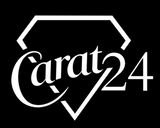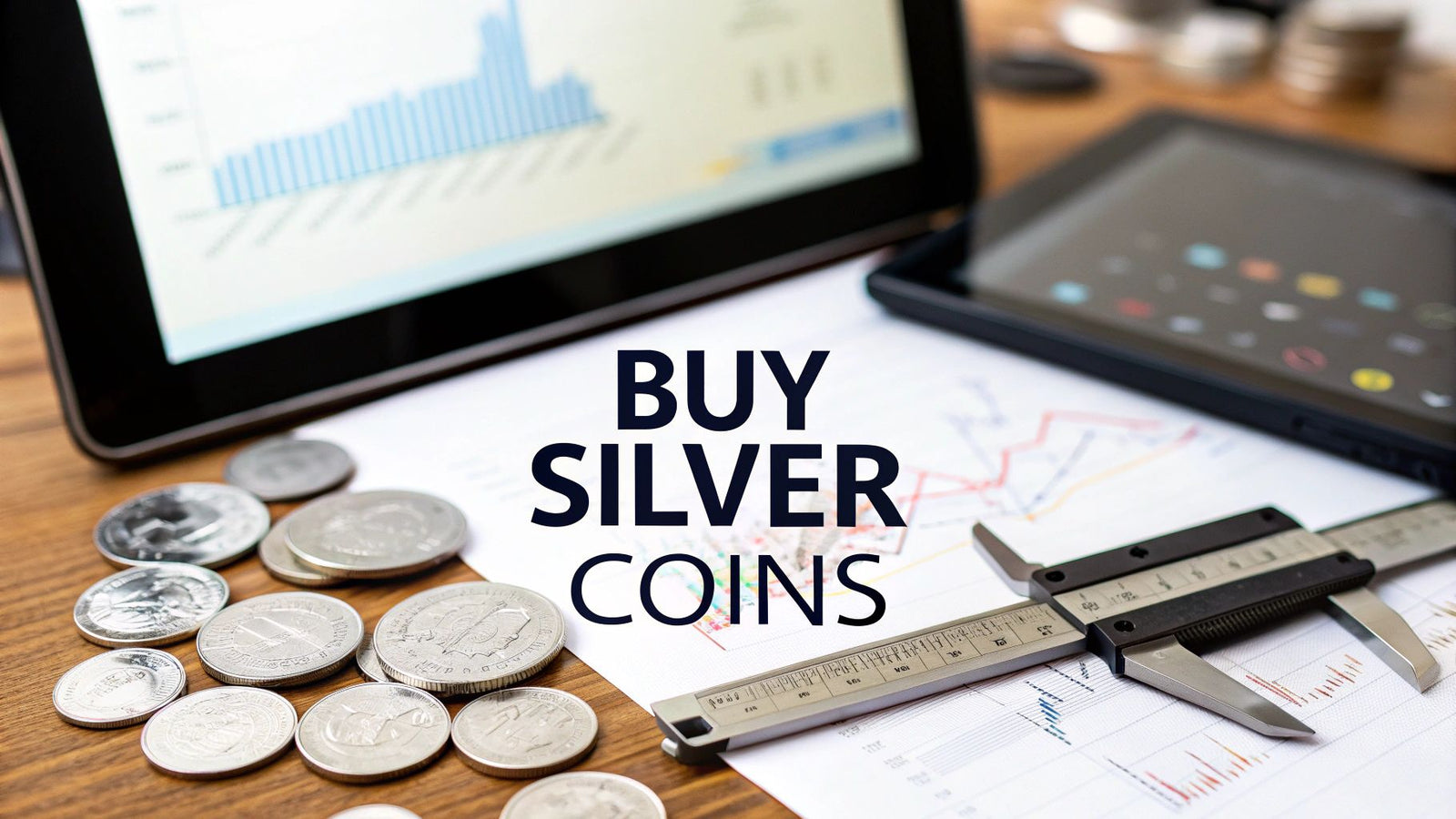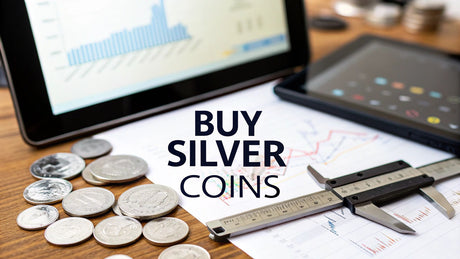So, you're thinking about jumping into the world of silver coins. It’s a smart move—a tangible asset you can actually hold in your hand, something with real, lasting value. But getting started right is key. It's about knowing what to buy, why you're buying it, and how to spot a good deal from a bad one. A little groundwork now sets you up to build a collection that actually works for your financial goals.
Starting Your Silver Coin Investment Journey
Diving into silver is an exciting step, whether you're looking to hedge against inflation, diversify your portfolio, or just own a piece of history. Unlike stocks or crypto, silver coins are physical. There's a certain security that comes from holding a real asset, and that’s something you just can't replicate digitally.
The timing couldn't be better for new investors, either. We're seeing a real 'buyer's market' right now. Premiums over the melt value for popular coins like American Silver Eagles and Canadian Silver Maples have dropped to just 3–5% on bulk buys—a low we haven't seen in decades. This creates a fantastic entry point.
Bullion Versus Numismatic Coins
First things first: you need to decide what kind of silver coin you're after. There are two main camps: bullion and numismatic. They serve very different purposes, and knowing the difference will steer your entire investment strategy.
-
Bullion Coins: Think of these as silver in its most straightforward form. Their value comes almost entirely from their silver content, closely tracking the day-to-day price of the metal itself. They are meant for investing, plain and simple.
-
Numismatic Coins: These are the collector's items. Sure, they're made of silver, but their value is driven by things like rarity, historical importance, condition, and collector demand. Their price can soar far beyond the actual silver they contain.
For anyone just starting out, I almost always recommend sticking with bullion coins. Their pricing is transparent, and they're incredibly easy to buy and sell.
Take the American Silver Eagle, for instance. It's a government-minted bullion coin that every single dealer in the country will recognize and buy on the spot. It’s one of the most liquid, hassle-free precious metal assets you can own.
Bullion vs. Numismatic Silver Coins At a Glance
To make the choice even clearer, here's a quick side-by-side comparison to help you decide which path aligns with your investment style.
| Feature | Bullion Coins | Numismatic Coins |
|---|---|---|
| Primary Value | Precious metal content (silver melt value) | Rarity, condition, and historical significance |
| Pricing | Tied closely to the silver spot price plus a premium | Based on collector demand; can be highly subjective |
| Best For | Investors seeking a hedge against inflation or to own physical silver | Hobbyists, historians, and collectors |
| Liquidity | Very high; easy to buy and sell globally | Lower; requires finding a specific collector or dealer |
| Knowledge Needed | Minimal; just track the spot price and premiums | Extensive; requires deep knowledge of grading and history |
Ultimately, bullion is about wealth preservation, while numismatics is a hobby that can potentially become a high-return (and high-risk) investment.
Key Terms You Need to Know
To walk into a coin shop and sound like you know what you’re doing, you really only need to master two terms: spot price and premium.
The spot price is the live, up-to-the-second market price for one troy ounce of pure silver. It’s the baseline.
The premium is what the mint and the dealer add on top of the spot price. This covers the costs of manufacturing, distribution, and their profit. It's why a one-ounce silver coin will always cost a bit more than one ounce of raw silver. Grasping this simple formula is the key to comparing prices and knowing when you're getting a fair shake.
And as you get deeper into precious metals, don't forget that many local experts who handle silver also specialize in Gold and Jewelry Buying. This can be a great way to free up capital for more silver. If you happen to be in Idaho, finding a dealer who promises the highest payout in Boise for your gold and jewelry means you’re getting the most bang for your buck. The best ones offer transparent services like free Xray Scanning and Gold Testing and give you hassle free offers. Some even do Price Matching to seal the deal.
Honestly, it's smart to save the hassle and sell locally for more than online shipments. You get paid instantly and avoid the stress of shipping valuable metals.
Finally, once you start building that stack, you need to protect it. We put together a guide with some crucial tips on how to store your silver coins properly to keep them in pristine condition for years to come.
How to Confidently Verify Your Silver Coins
When you’re ready to buy silver coins, the biggest hurdle is often trust. How can you be absolutely sure the coin in your hand is the real deal?
While fakes are out there, a few simple, hands-on tests can give you the confidence you need. The best part? These methods don't require expensive lab equipment and you can do them almost anywhere.
Moving beyond a quick visual check is your first line of defense. Genuine silver has unique physical properties that counterfeiters find incredibly difficult to replicate perfectly. Learning to spot these differences is a skill that will serve you well for years to come. It’s all about training your senses—your hearing, your touch, and your eye for detail.
Simple At-Home Verification Techniques
One of the oldest and most satisfying methods is the ping test. Gently balance a silver coin on the tip of your finger and tap it lightly with another coin. Real silver produces a distinct, high-pitched, bell-like ring that hangs in the air for a second or two. A counterfeit made from cheaper base metals will just sound dull and flat—more of a short, clunky thud.
Another great tool is a simple digital caliper, which you can find online for cheap. Every government-minted bullion coin, like an American Silver Eagle, has exact official specifications for its diameter and thickness. You can look these up directly on the mint's website. If a coin's measurements are off, even by a tiny fraction, it's a massive red flag.
This infographic gives you a quick visual rundown of the core principles of coin verification.
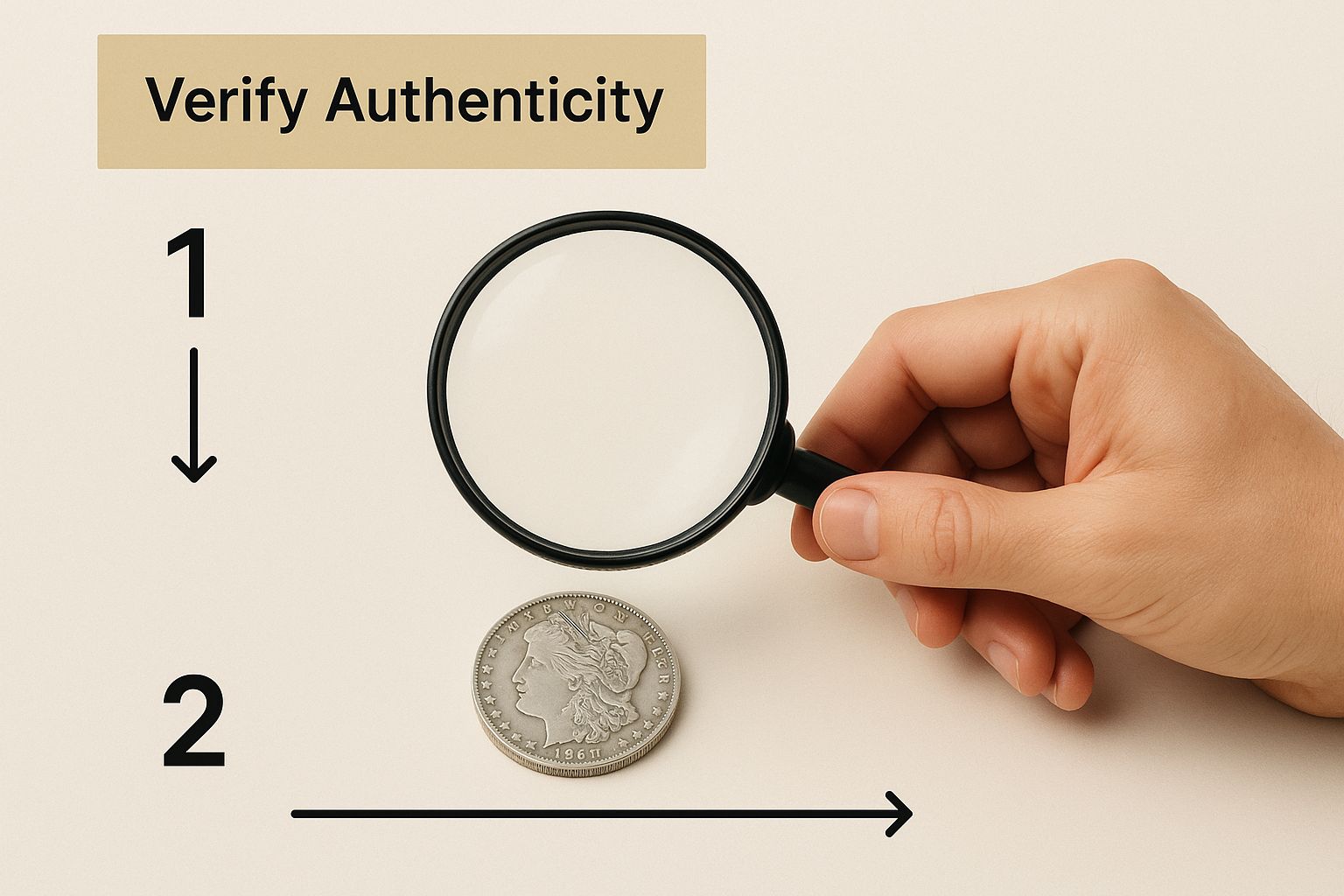
As the image shows, a close, detailed examination is key when you're working to verify authenticity.
You can also use a strong rare-earth magnet, like a neodymium magnet. Silver is diamagnetic, meaning it won't be attracted to a magnet. If you hold a strong magnet to your coin and it sticks, you definitely have a fake. If you slide the magnet across the coin's surface, you should feel a slight resistance or braking effect from eddy currents, but never an actual magnetic pull.
A key takeaway here is that no single test is foolproof. The most effective approach is to combine these methods. A coin that passes the ping test, matches official specs, and shows no magnetic attraction is almost certainly genuine.
The Professional Standard for Purity
While at-home tests are great for a quick check, nothing beats professional verification for absolute peace of mind. This is where a reputable local dealer becomes an invaluable partner.
The gold standard in the industry for non-destructive testing is an X-ray fluorescence (XRF) scanner. This sophisticated machine analyzes the exact metallic composition of an item without leaving so much as a scratch.
Many trusted local experts, especially those who specialize in Gold and Jewelry Buying, offer this service for free. It’s a huge sign of transparency and commitment to their customers. When you bring a coin in, they can perform a quick scan and show you the precise purity right on the screen—confirming it’s .999 fine silver, for example.
This service is especially crucial if you're looking to sell. A dealer who provides free Xray Scanning and Gold Testing is giving you a transparent, hassle free offer based on verifiable data. If you’re in Idaho, finding a shop that guarantees the highest payout in Boise and backs it up with this technology ensures you’re getting top dollar. It’s one of the biggest reasons to save the hassle and sell locally for more than online shipments.
For more tips on maintaining your collection, our guide on how to clean a silver dollar can be a useful resource for preserving its condition and value.
Finding a Reputable Dealer You Can Trust
Where you buy your silver coins is every bit as important as which coins you buy. A good dealer isn't just a seller; they become a trusted partner in your investment journey, offering solid advice, fair prices, and most importantly, peace of mind. Getting this step right lays a foundation of trust from day one.
Your search will probably take you down two main roads: massive online bullion dealers and your local coin shop. Online giants boast huge inventories and the convenience of shopping from your couch, but it can feel impersonal. Plus, you have to wait (and worry) until your package arrives. This is where a local expert really shines. A brick-and-mortar shop lets you hold the coins, ask questions face-to-face, and build a real relationship.
Vetting Your Dealer: Local or Online
Whether you’re clicking through a website or walking through a door, a little homework goes a long way. A dealer worth their salt operates with total transparency and won't hide their credentials. Don't be shy about digging in before you hand over your money.
Here are a few practical checks you can run in a few minutes:
- Check for Professional Affiliations: Are they members of respected groups like the American Numismatic Association (ANA) or the Professional Numismatists Guild (PNG)? This shows they’re committed to playing by the rules.
- Read Recent Customer Reviews: Go beyond the hand-picked testimonials on their site. Check out Google, Yelp, or even industry forums to see what people are saying about their actual, recent experiences.
- Confirm a Physical Address: For an online dealer, a real, verifiable street address (not just a P.O. Box) adds a huge layer of legitimacy. It proves they’re a tangible business, not just a website.
These simple steps can quickly weed out the fly-by-night operations from the established pros. It’s your best defense against potential scams and ensures you’re working with someone who actually values their reputation.
The Power of a Local Relationship
While online dealers are a perfectly fine option, there’s a unique advantage to building a relationship with an expert in your own community—advantages you just can't get through a screen. This becomes crystal clear when it’s time to sell.
When you save the hassle and sell locally for more than online shipments, you sidestep all the risks and delays that come with mailing precious metals. A local dealer can give you an instant, hassle-free offer right on the spot. Many of the best local shops even offer Price Matching, so you know you’re getting a competitive rate without the guesswork. This kind of direct, transparent interaction is how real trust is built.
The real game-changer with a local dealer is immediate verification and payment. You can walk in with an old silver coin, have it tested right in front of you, and walk out with cash. No shipping insurance, no risk of a lost package, and no waiting for a check to clear.
On top of that, the best local shops are often hubs for more than just coins. They are typically experts in Gold and Jewelry Buying, making them a one-stop shop when you need to liquidate different valuables. If you're in our area, finding a dealer that promises the highest payout in Boise for gold and silver means you’re putting the most money back in your pocket.
These top-tier establishments invest in technology to back up their word. A key service to look for is X-ray Scanning and Gold Testing for free. When a dealer uses a professional XRF scanner to verify the exact purity of your items right before your eyes, it removes all doubt. You know their offer is based on precise, scientific data, not a hunch.
You can learn more about how a deep commitment to expertise and customer service truly defines a trustworthy local dealer by exploring our own story and process.
Understanding Silver Prices to Avoid Overpaying
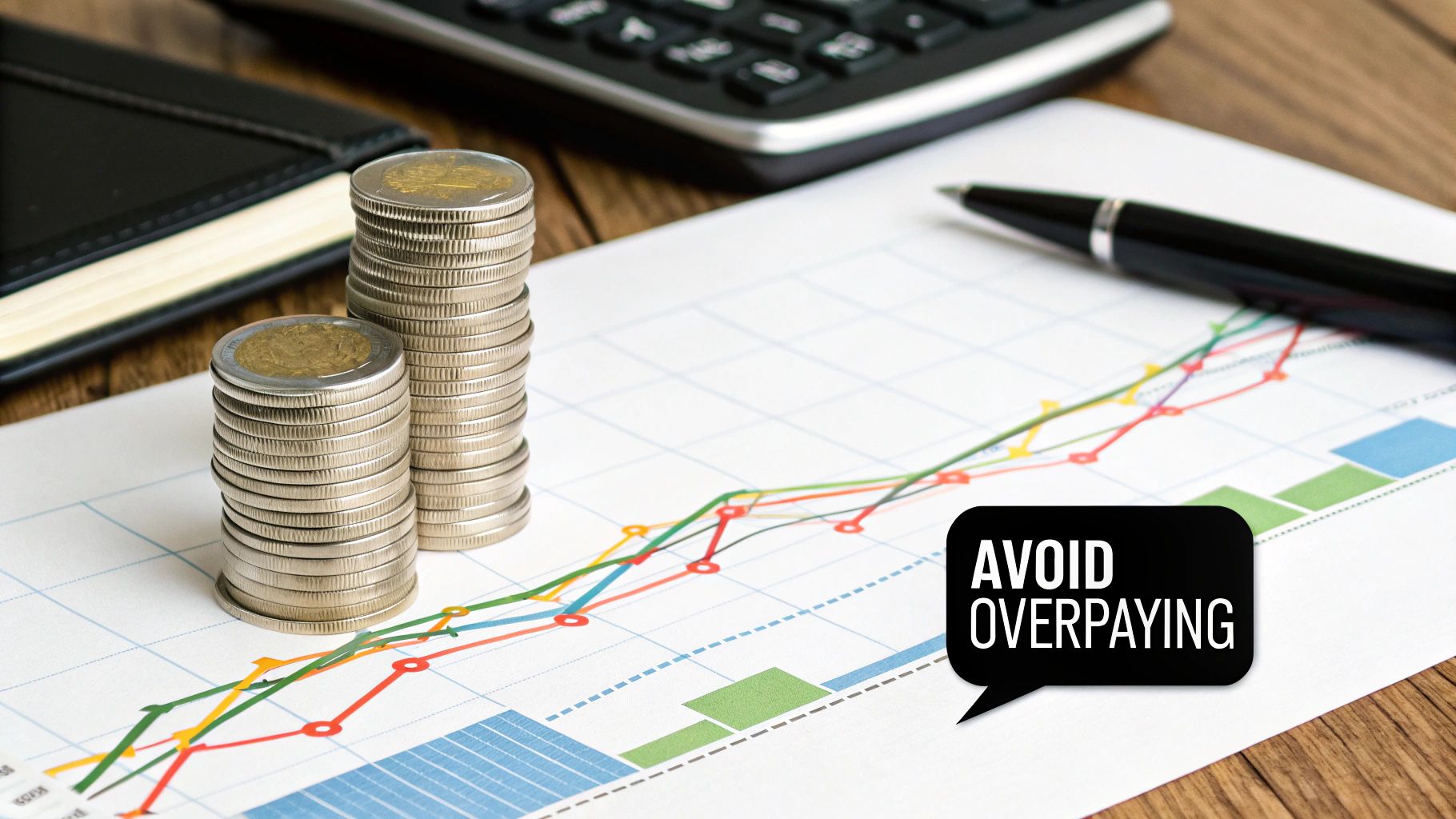
Knowing how silver coin pricing actually works is your best defense against paying too much. The price you see on a tag isn't just a number someone made up; it's based on a simple, universal formula. Once you get a handle on it, you can confidently compare deals, ask smart questions, and ultimately, get more silver for your dollar.
This is the bedrock of the entire precious metals market. Learning it now will pay dividends whether you're buying your first American Eagle or a full "monster box." It takes the mystery out of the equation and lets you walk into any transaction feeling like you're in control.
The Foundation: Spot Price
Every single silver transaction begins with one core number: the spot price.
Think of it as the live, raw material cost for one troy ounce of pure silver on the global market. This number is constantly in motion, fluctuating throughout the day based on supply, demand, and all sorts of economic news.
Any reputable dealer will anchor their pricing to the current spot price. It's the baseline that keeps things fair and transparent for everyone. Before you even think about buying silver coins, your first move should always be to check the live spot price online.
The global silver market has been on a tear lately. Since the beginning of the year, spot prices have jumped from $28.92 per ounce in January to $37.44 by early August. That’s a climb of about 29.5% in just over seven months. This rally is a direct reflection of intense investor interest and a market that's been dealing with a supply shortage for five years straight. You can dig deeper into this trend and what it means for silver prices in a recent market outlook.
What Are Premiums?
The second piece of the pricing puzzle is the premium. This is simply the amount added on top of the spot price. It covers all the real-world costs of transforming raw silver into a beautiful coin and getting it into your hands.
These costs include:
- Minting and Fabrication: The intricate process of striking raw silver into a detailed coin.
- Dealer Overhead: All the things that keep a business running, from rent and security to employee salaries.
- Profit Margin: The small slice the dealer earns to stay in business.
Every silver product has a premium, from a basic generic round to a government-backed coin. The key to smart buying is understanding why those premiums are different.
A freshly minted American Silver Eagle will always have a higher premium than a simple, one-ounce generic silver round. You're not just paying for the silver; you're paying for the U.S. Mint's guarantee of weight and purity, its world-famous design, and its instant recognizability.
How Premiums Change Your Final Cost
Premiums aren't set in stone. They shift based on the specific coin, its condition, and even how many you're buying at once. A rare or highly sought-after coin, for instance, is going to have a much higher premium because of collector demand.
One of the easiest ways to bring down your average cost is to buy in larger quantities. Purchasing a "mint tube" of 20 silver coins will almost always get you a better premium per coin than buying those same 20 coins one by one. Dealers reward volume because it’s simply more efficient for them. This same logic helps when you're figuring out the value of a 5 oz silver bar or coin, as bigger chunks of metal often have lower per-ounce premiums.
When it's time to sell, this knowledge is just as critical. A trusted local expert in Gold and Jewelry Buying will use the same spot-plus-premium logic to make you an offer. If you're in Idaho, look for a dealer who guarantees the highest payout in Boise and offers Price Matching—that's how you know you're getting a competitive rate. They should provide hassle-free offers and back them up with free services like Xray Scanning and Gold Testing, giving you total transparency.
Ultimately, you can save the hassle and sell locally for more than online shipments, ensuring you get a secure transaction and immediate payment.
Expanding Your Portfolio with Gold and Jewelry
While diving into silver coins is a fantastic way to get your feet wet in precious metals, the real key to building lasting wealth is diversification. Putting all your eggs in one basket is never a good strategy, and that holds true for tangible assets. By strategically adding gold and even high-quality jewelry to your holdings, you can build a far more balanced and resilient portfolio.
This isn't about ditching your silver stack. It's about complementing it. Gold, the classic safe-haven asset, often behaves differently in the market than silver, creating a powerful counterbalance that helps your collection stand strong, no matter what the economy throws at it.
Gold Coins and Bars The Classic Safe Haven
Think of gold as silver’s more stable, mature sibling. Silver can be a wild ride with its price volatility, which offers incredible growth potential. Gold, on the other hand, is prized for its historical stability. For thousands of years, it has been the ultimate store of value—a reliable hedge against inflation, currency devaluation, and geopolitical chaos.
Adding gold to your collection is a time-tested diversification move. A great place to start is with globally recognized one-ounce gold coins. They're just as liquid and trusted as their silver counterparts.
- American Gold Eagle: The flagship gold coin from the U.S. Mint. It’s instantly recognizable and incredibly easy to trade anywhere in the world.
- Canadian Gold Maple Leaf: Famous for its .9999 purity, making it one of the purest gold coins you can buy.
- Gold Bars: If you're looking to make a larger investment, gold bars are a smart choice. They typically carry lower premiums per ounce compared to coins, making them a more cost-effective way to stack weight.
Bringing gold into the mix offers a different kind of security. Its value is less tied to industrial demand and more to its long-standing role as a global monetary asset. This makes it a powerful anchor for any portfolio.
Beyond Bullion Looking at Gold and Silver Jewelry
Diversification doesn’t just stop with coins and bars. Gold and silver jewelry is another tangible asset class worth considering, one that blends the intrinsic value of precious metal with true craftsmanship and aesthetic appeal. But you have to know what you're doing, because evaluating jewelry requires a completely different skillset than sizing up a bullion coin.
When you buy jewelry, you’re not just buying metal; you’re buying a finished piece of art. The secret is knowing how to assess it properly.
The first thing you should always do is look for purity marks. For gold, you'll see a karat stamp like "14K" or "18K". For silver, look for a "925" or "Sterling" stamp, which means it's 92.5% pure silver. These tiny marks are your first clue to the item's real value.
Beyond that stamp, you need to consider the item's condition, the quality of its craftsmanship, and any gemstones it might feature. A well-made piece from a known designer will always carry value beyond its simple weight in gold or silver. If you want to go deeper, our guide to buying gold and diamonds offers a much closer look at how to evaluate these beautiful assets.
The Local Advantage for Building Your Portfolio
As your collection grows and becomes more complex, your relationship with a trusted local expert becomes more important than ever. While buying standard silver coins online is one thing, diversifying into gold and unique jewelry is another. A local specialist offers a level of service and expertise you just can't get through a website, especially when it’s time to sell or trade assets to rebalance your portfolio.
Working with a local buyer in a market like Boise who specializes in Gold and Jewelry Buying ensures you get the highest payout in Boise. You can save the hassle and sell locally for more than online shipments, completely avoiding the risks and delays that come with mail-in services. The best local dealers provide instant, hassle free offers and might even offer Price Matching to guarantee you're getting a competitive price.
This local connection is about more than convenience; it's about transparency and trust. A reputable expert can provide Xray Scanning and Gold Testing for free, right in front of you. Using an X-ray fluorescence (XRF) scanner, they can instantly verify the exact purity of a gold chain or an unmarked silver piece. This ensures their offer is based on hard data, not just a guess. That's the kind of confidence you need to build a robust, diversified portfolio with an expert partner you can rely on.
Answering Your Top Silver Coin Questions
As you get ready to buy silver coins, a few questions almost always come up. Getting clear, practical answers is the final step before you can move forward with total confidence. Think of this section as your quick-reference guide, built to tackle the most common uncertainties head-on.
It’s completely normal to have questions. In fact, asking them is the sign of a smart investor who takes their financial future seriously.
What Are the Best Silver Coins for a Beginner to Buy?
For anyone just starting out, the answer is simple: stick with government-minted bullion coins. Coins like the American Silver Eagle or the Canadian Silver Maple Leaf are the perfect entry point for a few key reasons.
Their value is almost entirely tied to the daily silver spot price, which makes them incredibly easy to track. You don’t have to worry about complex numismatic or collector values. More importantly, their weight and purity are guaranteed by a sovereign government, making them instantly recognizable and trusted by dealers worldwide.
This high liquidity means they are as easy to sell as they are to buy, providing a hassle-free foundation for your growing portfolio.
How Do I Know if I’m Getting a Fair Price?
Getting a fair price all comes down to transparency. The first thing you should do is check the live silver spot price online—this is your baseline. A reputable dealer will always price their coins using a clear formula: spot price + premium.
Don't be afraid to ask a dealer to break down their pricing for you. A trustworthy seller will happily explain how they arrived at their final number. The best practice is to compare the all-in cost from two or three different dealers.
If a local shop offers Price Matching, that’s a fantastic sign. It shows they’re confident in their competitive pricing and are committed to earning your business with a fair deal.
Is It Better to Buy From a Local Shop or Online?
Both have their merits, but a local shop provides distinct advantages that online retailers just can't match. The ability to walk in, inspect the coins with your own eyes, and get immediate, face-to-face advice from an expert is invaluable. You also completely eliminate shipping costs, insurance fees, and the anxiety of waiting for a valuable package to arrive in the mail.
This local advantage becomes even more pronounced when it’s time to sell.
When you save the hassle and sell locally for more than online shipments, you get an instant transaction. There's no risk of a lost package or waiting for a check to clear. A trusted local dealer can provide an immediate, hassle free offer and pay you on the spot.
For those in our community, this often means receiving the highest payout in Boise. Local experts who are also specialists in Gold and Jewelry Buying can offer a one-stop solution for liquidating various assets. They provide a level of security and immediacy—like offering Xray Scanning and Gold Testing for free—that builds true, lasting trust. That hands-on, transparent approach is something an online cart just can't deliver.
How Should I Store My Silver Coins Safely?
Proper storage is non-negotiable if you want to protect the value of your investment. For most collectors, a high-quality, fireproof home safe is the most practical and secure solution. It’s also crucial to protect the coins themselves from environmental damage.
To prevent scratches, toning, and tarnish, always keep your coins in airtight plastic capsules or in their original mint tubes. Try to avoid storing them in humid areas like basements or garages, as moisture can speed up the tarnishing process.
For very large or valuable collections, you might consider the added security of a bank's safe deposit box or a specialized precious metals depository. These services offer insured, climate-controlled storage for complete peace of mind.
Ready to take the next step in your investment journey with a trusted local expert? At Carat 24 - Trusted Gold Experts, we offer transparent pricing, expert advice, and a commitment to helping you build your legacy with confidence. Visit us to explore our collection or get a fair, hassle-free offer on your precious metals today at https://carat24boise.com.
